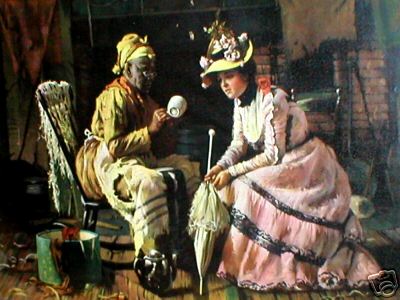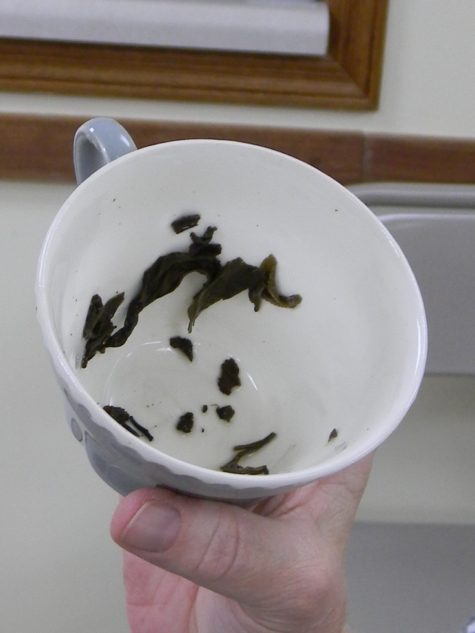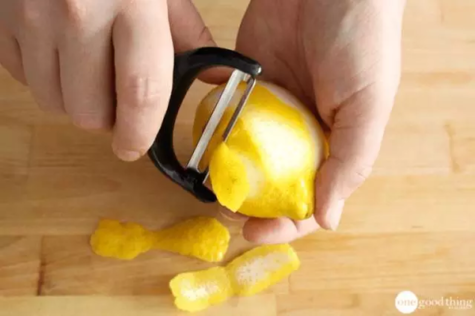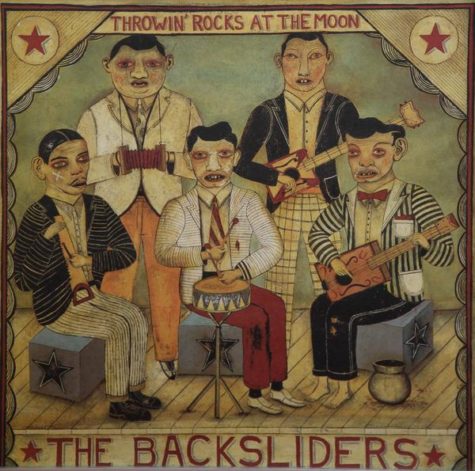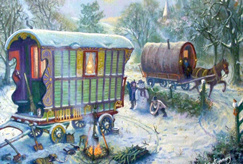Fortune Telling
In The Days We Went A-Gipsying
When as a lad I trudged along in the brick-yards, now more than forty years ago, I remember most vividly that the popular song of the employees of that day was
“When lads and lasses in their best
Were dress’d from top to toe,
In the days we went a-gipsying
A long time ago;
In the days we went a-gipsying,
A long time ago.”
Every “brick-yard lad” and “brick-yard wench” who would not join in singing these lines was always looked upon as a “stupid donkey,” and the consequence was that upon all occasions, when excitement was needed as a whip, they were “struck up;” especially would it be the case when the limbs of the little brick and clay carrier began to totter and were “fagging up.” When the task-master perceived the “gang” had begun to “slinker” he would shout out at the top of his voice, “Now, lads and wenches, strike up with the:
“‘In the days we went a-gipsying, a long time ago.’”
And as a result more work was ground out of the little English slave. Those words made such an impression upon me at the time that I used to wonder what “gipsying” meant.
Somehow or other I imagined that it was connected with fortune-telling, thieving and stealing in one form or other, especially as the lads used to sing it with “gusto” when they had been robbing the potato field to have “a potato fuddle,” while they were “oven tenting” in the night time. Roasted potatoes and cold turnips were always looked upon as a treat for the “brickies.”
I have often vowed and said many times that I would, if spared, try to find out what “gipsying” really was. It was a puzzle I was always anxious to solve. Many times I have been like the horse that shies at them as they camp in the ditch bank, half frightened out of my wits, and felt anxious to know either more or less of them. From the days when carrying clay and loading canal-boats was my toil and “gipsying” my song, scarcely a week has passed without the words
“When lads and lasses in their best
Were dress’d from top to toe,
In the days we went a-gipsying
A long time ago,”
ringing in my ears, and at times when busily engaged upon other things, “In the days we went a-gipsying” would be running through my mind.
In meditation and solitude; by night and by day; at the top of the hill, and down deep in the dale; in the throng and battle of life; at the deathbed scene; through evil report and good report these words, “In the days we went a-gipsying,” were ever and anon at my tongue’s end. The other part of the song I quickly forgot, but these words have stuck to me ever since.
 On purpose to try to find out what fortune-telling was, when in my teens I used to walk after working hours from Tunstall to Fenton, a distance of six miles, to see “old Elijah Cotton,” a well-known character in the Potteries, who got his living by it, to ask him all sorts of questions.
On purpose to try to find out what fortune-telling was, when in my teens I used to walk after working hours from Tunstall to Fenton, a distance of six miles, to see “old Elijah Cotton,” a well-known character in the Potteries, who got his living by it, to ask him all sorts of questions.
Sometimes he would look at my hands, at other times he would put my hand into his, and hold it while he was reading out of the Bible, and burning something like brimstone-looking powder—the forefinger of the other hand had to rest upon a particular passage or verse; at other times he would give me some of this yellow-looking stuff in a small paper to wear against my left breast, and some I had to burn exactly as the clock struck twelve at night, under the strictest secrecy.
The stories this fortune-teller used to relate to me as to his wonderful power over the spirits of the other world were very amusing, aye, and over “the men and women of this generation.” He was frequently telling me that he had “fetched men from Manchester in the dead of the night flying through the air in the course of an hour;” and this kind of rubbish he used to relate to those who paid him their shillings and half-crowns to have their fortunes told.
My visits lasted for a little time till he told me that he could do nothing more, as I was “not one of his sort.”
From: Gipsy Life, by George Smith, 1880
More About Tea Leaves
In the old days, a Romany woman would read a housewife’s tea leaves in exchange for a refreshing cuppa and a few old clothes. Sometimes a Gypsy Queen, dressed in her finest and laden with all her jewelry, would preside over a special tea-drinking party for a few favored clients. The best bone china and lace tablecloth would be brought out to impress upon the Rawnies (ladies) the importance of the occasion – and how privileged they were to be invited. No doubt the fee for the teacup-reading was suitably increased to fit the occasion.
It is not only tea leaves that can be used for this type of reading: coffee and cocoa grounds, or anything that leaves a sediment in the cup, can be used in the same way. If you prefer teabags, you can of course break open the bag before making the tea in the usual way. This should ensure that a good pattern is left in the cup, but if you do take the trouble to make a good old-fashioned pot of loose-leafed tea, you will also have the extra bonus of a truly satisfying taste.
One drawback with reading the teacups is that is is all too easy to fall into the habit of reading the cups at every tea break, which tends to belittle this method and turn it into a parlour game. But as long as it is used with respect it will give excellent results.
Most authorities state that the cup should be plain white and shallow, but I have never found that the shape of the cup was important, nor that a patterned cup adversely affected the reading. Indeed, Romanies have always disliked plain white china, preferring it to be richly decorated.
From Gypsy Magic by Patrinella Cooper
Note:
More information on Tea Leaf divination can be found here: Divination – Reading Tea Leaves
Reading Tea Leaves – Basic Instructions
The enquirer should drink their tea until only a spoonful or so is left in the bottom of the cup. They should hold the cup in the left hand and swirl it around three times in an anti-clockwise direction, then turn it upside down to drain. The cup is then passed to the person who is to read it.
Prepare to do the reading by quietening the mind. Hold the cup with the handle in your right hand, or you can hold it in both hands if it feels more comfortable. The brain likes to make pictures out of abstract blobs, which is why we see faces in stained walls or castles in clouds. It is this principle that inspires the psyche to see omens in the tea leaves. Move the cup about if it helps you to see the patterns clearly. It can also help if you let your eyes go slightly out of focus.
The leaves should be read in a kind of spiral motion working anti-clockwise from the handle around the rim, back to the handle, then the sides, and finally the bottom of the cup. As a general rule, the nearer to the rim of the cup a symbol appears, the sooner the event will be. The larger the symbol, the greater will be the impact on the enquirer’s life.
From: Gypsy Magic
by Patrinella Cooper
Note:
More about reading tea leaves can be found here: Divination – Reading Tea Leaves
Gypsies and Dreaming
Gypsies hold much stock in dreams and are renowned dream interpreters. Although Tunisian and Algerian Romanies are the recognized experts in this field, English Gypsies certainly have been practicing dream interpretation for many generations.
In common with all Gypsies, the English Travelers maintain that through dreams they are being given secret knowledge that could affect their future, positively or negatively. They believe dreams come from the spirits of their ancestors.
Gypsies are actually very observant and, in some ways, very prosaic. The first thing a knowledgeable Romani will do when asked about the significance of a particular dream is to inquire about the person’s general health and eating habits. Most of us, Gypsies included, are aware that a lot of dreaming is simply the result of excesses in eating and/or drinking.
Charles Bowness, in Romany Magic, says:
“Apart from those dreams brought on by stomachic derangement there are also those occasioned by some bodily excitation due to a previous pleasant or unpleasant experience. Another cause is tension owing to brooding over some problem or fear of a future event.
To categorize further, dreams of terror can be due to a slight and temporary disorder of the heart. Similarly, a defect in the lungs can be responsible for a dream of bloodshed. To experience some enormous difficulty in a dream, such as hacking a way through a jungle, or trying to penetrate a wall indicates disorder of the liver. Dreaming of sharp pains, knife stabs in the back and the like, is because of kidney disorder. If a dream contains some element of hypnotic regularity such as the swinging of a pendulum, then there may well be a tendency to anaemia.”
It is obvious that one cannot simply take any dream and say, “Oh, yes. That means such-and-such.” The question is, then, which dreams can be interpreted? The Gypsies say any dream that is especially vivid; one that stays with you after you wake. Additionally, it should be one that is dreamed when you are in good health and have not overindulged the night before.
~Text: Raymond Buckland
~Artist: Kathy Ostman-Magnusen
The Love Pendulum
The pendulum can be used for many things: finding lost objects, discovering hidden treasures, divining water, communicating with spirits of the dead, diagnosing illness an prescribing medicine…all these and more. Gypsies use the pendulum quite a lot. One of the uses to which they put it is in determining whether or not a particular lover is the right one for you.
The pendulum itself should be a ring suspended on a length of red silk thread or ribbon. Many girls use their mother’s wedding band for the ring. The only other thing you need is a connection with the one you are wondering about. This can be an article of his or her clothing, a handkerchief, a watch, ring, or other piece of jewelry, a photograph, or anything similar that has a direct link with the person.
Simply sit with the object, photograph, or whatever in front of you and hold the pendulum over it. It doesn’t matter whether or not your elbow rests on the table, but hold the thread so that the ring is suspended about an inch or so above the object. Allow seven inches of the thread between your fingers and the ring.
Concentrate your thoughts on the person you are wondering about. Is he/she the right one for you? Think of all their good qualities, and their bad. Then say:
Av, ml Romani mal, Pawdel dur chumbas.
Av kitane mansa?
This little verse in Romanes (the Gypsy language) can be roughly translated as:
“Come my Gypsy friend, over the hills so far away.
Will you come along with me?”
Repeat it, saying it three times in all.
As you say the verse the pendulum will start to swing. If it swings backwards and forwards, towards you and away from you, then it means “yes,” that person is the right one for you. But if it swings from side to side, across you, then it means “no,” they are not right for you. With some people the pendulum may swing in a circle, rather than backwards and forwards. If it does, then clockwise means “Yes” and counterclockwise means “no”.
The Revealing Peel
To find if the one you love will become your spouse, do the following.
In the morning, as soon as you arise, peel a small lemon. Keep two equal pices of the peel, each about the size of a half-dollar. Place the pieces with the insides together and the peel sides out, and put them in your right-hand pocket or in your purse. Leave them there all day.
At night, when you undress for bed, take the peel from your pocket or purse and rub the legs of the bed with it. Then place both pieces of the peel under your pillow and lay down to sleep. If you dream of your love, then you will surely marry him/her.
River of Dreams
A way to determine whom you will marry is to use a bowl of water and a flat stick. The bowl should be earthenware and should be filled at least half full of water that has been taken from a flowing stream. A flat stick or piece of wood is then laid across the bowl, from one edge to the other. This represents a bridge over a river or stream.
On the night of a Full Moon, place the bowl of water and stick underneath your bed. Just before you sleep, concentrate your thoughts on an actual footbridge over a stream. Tell yourself that you will dream of it that night. Not only will you dreams of the bridge, but you will dream of yourself crossing the bridge and, halfway over, falling off into the water. But you have no fear, someone will come and rescue you.
With these expectations, built up in your mind throughout the day and then reinforced just before you sleep, you should have no trouble actually having that dream. The trick then is to remember when you wake who it was who came to your rescue and pulled you from the water. That person is your future spouse.
Throwing Rocks At The Moon
At the new moon, spit on a little stone, then throw it in the air, if it comes down wet…there will be much sickness…if dry, good luck to come.
From: Vermont Deadline
Romany Water Divination
Romany children play at divination using water and a stone to find the answer to a question. Here’s how it works:
Holding a stone, sit in front of a bowl of water and ask a question, one that can be answered with either a yes or a no.
Drop the stone into the water and carefully count the ripples it creates. An even number of ripples means yes; an odd number, no.
Found in: The Good Spell Book
Gypsy Hair Divinations
Throw some hair into a fire. It is said to be a sign of long life if the hair flames up vigorously. It is an omen of ill health if it simply smolders away.
To determine whether a person is flirtatious, pluck a single hair from their head. The hair should then be stretched between the forefingers and thumbs. The more it curls when released, the more flirtatious the owner.
Another piece of lore: if a woman’s hairpin falls out, someone is thinking of her.
Found in: The Good Spell Book

